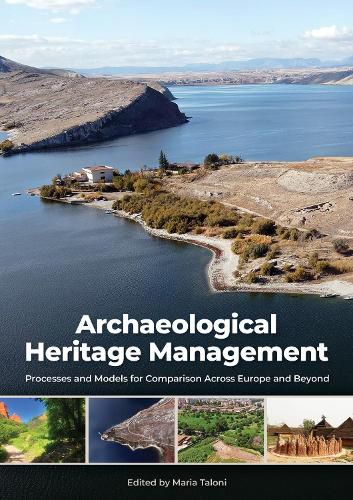Readings Newsletter
Become a Readings Member to make your shopping experience even easier.
Sign in or sign up for free!
You’re not far away from qualifying for FREE standard shipping within Australia
You’ve qualified for FREE standard shipping within Australia
The cart is loading…






Archaeological heritage has broadened increasingly because management is no longer, or not only, based on centralised state governance, but is open to so-called collaborative approaches. Such approaches demonstrate the need to integrate communities and private individuals in management and enhancement processes, either through special forms of partnership or by signing conventions, agreements or memoranda of understanding, or by changing the structure and organisation of state governance (for example, archaeological museums and local authorities for the protection of archaeological heritage). This book compares the different ways of managing archaeological cultural heritage in different national and regional realities, in light of recent and future organisational reforms of central government structures to which the management and conservation of archaeological cultural heritage was delegated in the past. The comparison between different national and local realities should highlight, not only on a theoretical level but also through the presentation of concrete case studies, the strengths and weaknesses of the various approaches and create an interdisciplinary and international debate that unites the scientific community of archaeologists. The identification of good practices applicable to common problems in different contexts or the need for context-specific solutions should lead to the creation of shared knowledge and management models that are more and more necessary in an increasingly interconnected world of cultural heritage management and enhancement. The volume arises from a major session at the European Association of Archaeologists 30th Annual Meeting, held in Rome in August 2024, and contributors were tasked with providing description and discussion of different processes and models for archaeological heritage management both at national and more local levels; to consider the impact of different processes and models on the management of archaeological heritage; and outline future challenges and opportunities in the management of archaeological heritage. Additional contributions have been commissioned covering regions not represented in the session to provide a wide ranging coverage for countries across Europe. By combining case studies with specific national and regional approaches and practices, this volume will prove a key source of information for archaeological and heritage management practitioners throughout Europe and beyond. AUTHOR: Maria Taloni graduated in Archaeology, specialising in Etruscology, from the University of Rome in 2006 and completed her PhD in 2011, which focused on the Mediterranean context of the Orientalising period. This was further explored during her postdoctoral fellowships in Germany and Greece. She worked as an archaeologist at the Italian Ministry of Culture, contributing to cultural heritage policies. In 2023, she joined the National Research Council as a researcher in Etruscology and cultural heritage management. Since 2020, she has also served on the European Association of Archaeologists' Executive Board. 50 b/w illustrations
$9.00 standard shipping within Australia
FREE standard shipping within Australia for orders over $100.00
Express & International shipping calculated at checkout
Archaeological heritage has broadened increasingly because management is no longer, or not only, based on centralised state governance, but is open to so-called collaborative approaches. Such approaches demonstrate the need to integrate communities and private individuals in management and enhancement processes, either through special forms of partnership or by signing conventions, agreements or memoranda of understanding, or by changing the structure and organisation of state governance (for example, archaeological museums and local authorities for the protection of archaeological heritage). This book compares the different ways of managing archaeological cultural heritage in different national and regional realities, in light of recent and future organisational reforms of central government structures to which the management and conservation of archaeological cultural heritage was delegated in the past. The comparison between different national and local realities should highlight, not only on a theoretical level but also through the presentation of concrete case studies, the strengths and weaknesses of the various approaches and create an interdisciplinary and international debate that unites the scientific community of archaeologists. The identification of good practices applicable to common problems in different contexts or the need for context-specific solutions should lead to the creation of shared knowledge and management models that are more and more necessary in an increasingly interconnected world of cultural heritage management and enhancement. The volume arises from a major session at the European Association of Archaeologists 30th Annual Meeting, held in Rome in August 2024, and contributors were tasked with providing description and discussion of different processes and models for archaeological heritage management both at national and more local levels; to consider the impact of different processes and models on the management of archaeological heritage; and outline future challenges and opportunities in the management of archaeological heritage. Additional contributions have been commissioned covering regions not represented in the session to provide a wide ranging coverage for countries across Europe. By combining case studies with specific national and regional approaches and practices, this volume will prove a key source of information for archaeological and heritage management practitioners throughout Europe and beyond. AUTHOR: Maria Taloni graduated in Archaeology, specialising in Etruscology, from the University of Rome in 2006 and completed her PhD in 2011, which focused on the Mediterranean context of the Orientalising period. This was further explored during her postdoctoral fellowships in Germany and Greece. She worked as an archaeologist at the Italian Ministry of Culture, contributing to cultural heritage policies. In 2023, she joined the National Research Council as a researcher in Etruscology and cultural heritage management. Since 2020, she has also served on the European Association of Archaeologists' Executive Board. 50 b/w illustrations